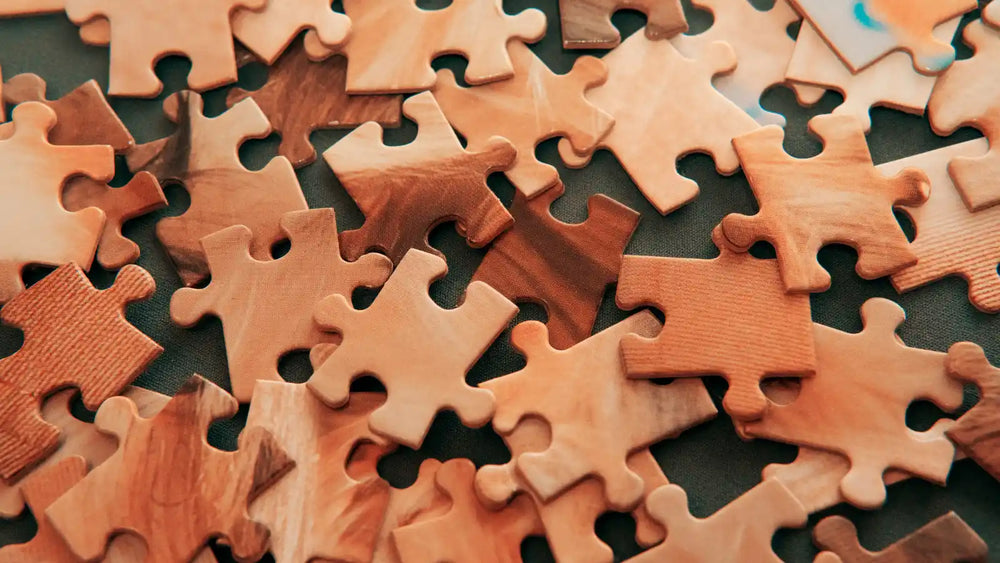
Are wooden puzzles recyclable? People often ask this when they want eco-friendly hobbies. Knowing if something can be recycled helps the Earth.
Recycling wood means turning old wood into new things. But wooden puzzles are tricky because they are solid wood. Some makers use green methods, but many puzzles go in regular trash. Looking into recycling choices helps you choose better for the planet.
Key Takeaways
- Wooden puzzles are challenging to recycle due to their solid wood composition, which can disrupt recycling processes.
- The type of wood, the presence of chemicals, and local recycling guidelines greatly affect whether wooden puzzles can be recycled.
- If recycling isn't possible, consider donating puzzles or creatively repurposing them into art or home decor.
- Proper storage and gentle handling can extend the life of wooden puzzles, reducing waste and encouraging reuse.
Are Wooden Puzzles Recyclable?

General Recyclability of Wood
Recycling wood helps the Earth. It saves trees and cuts down trash. Old wood can become new things like paper or energy. But not all wood fits recycling rules. Wooden puzzles are challenging to recycle. They are solid wood, which can mess up recycling if not handled right.
Scientific Research Findings:
- Recycling wood stops landfills from filling up and makes waste useful.
- The process of recycling keeps wood useful longer and lessens landfill trash.
Factors Affecting Recyclability
Many things decide if wooden puzzles can be recycled. The type of wood matters a lot. Some makers use eco-friendly wood, making their puzzle products better for nature. Still, many wooden puzzles end up as regular waste because they don't fit recycling rules.
Extra materials also matter. Paints or glues on puzzles can make recycling difficult, as they might contain chemicals that cause problems. So, it's important to see if the puzzle's materials are eco-friendly.
Knowing local recycling rules helps, too. Some places have special programs for wood; others don't. By checking local options, you can throw away your wooden puzzles the right way.
Understanding Wooden Puzzles
Materials Used in Wooden Puzzles
Wooden puzzles are made from different materials, which make them solid and special. Many puzzles use wood, which is good for the Earth. This means the wood comes from forests that stay healthy and grow well. Using this kind of wood helps nature.
Key Features of Wooden Puzzles:
- Sustainably Sourced Wood: Some companies get their wood from forests checked by the Forest Stewardship Council (FSC).
- Biodegradability: Unlike plastic ones, wooden puzzles break down naturally.
- Durability and Longevity: They're strong and last long, so you don't need new ones often.
The materials make wooden puzzles look nice and help the planet more than cardboard. This makes people ask, "Are wooden puzzles recyclable?" The answer depends on what they are made of and how they are made.
Environmental Impact of Wooden Puzzles
Wooden puzzles help the environment in many ways. They're better for people who care about nature. Making and getting rid of them uses less energy than other puzzles.
Environmental Benefits:
- Reduced Waste: Since they last long, you throw away fewer over time.
- Recyclable Packaging: Their boxes can be recycled, which is better for Earth.
- Local Production: Some makers build them nearby to cut travel pollution and help local jobs.
Even with these good points, we still ask if wooden puzzles can be recycled. The wood might not fit normal recycling bins, but making them is eco-friendly. Picking wooden puzzles helps you live green even if they're hard to recycle like usual things.
Local Recycling Guidelines
How to Find Local Recycling Options
Check your town's waste website for recycling info. Many places tell you what they recycle. Wooden puzzles need special care because they're solid wood. Regular recycling might not take them. Look for places that recycle wood.
Call your local waste office for help with wooden items. Some areas have spots just for wood drop-offs. These places ensure that wood is recycled properly without damaging other materials.
Community Recycling Initiatives
Community events can also help recycle wooden puzzles. Towns sometimes have days when people can bring hard-to-recycle things, like wood.
Sign up for local recycling drives. They work with groups that care about nature and might take wooden puzzles and other wood items. By joining, you help cut waste and save the planet.
Some towns have swap meets, too. You can trade puzzles there with others. This helps reuse items and saves them from trash. Joining these events supports a green world and cuts down on waste.
Alternatives to Recycling Wooden Puzzles

Donation Options
Giving away your puzzles can make others happy. Check that all the pieces are there first. You can give complete puzzles to:
- Thrift/Resale Shops: Many second-hand stores like complete puzzles. They sell them to help different causes.
- Senior Centers: Puzzles are great for older people's minds and fun. Donating to a senior center can cheer someone up.
- After-School Programs: These places want cool activities for kids. Your puzzles can be great for learning and fun.
- Child Care Centers: Kids' puzzles are loved in childcare places, helping with play and growth.
Creative Reuse Ideas
If giving away isn't possible, turn your puzzles into something new. Here are some ideas:
- Art Projects: Use puzzle pieces for unique art. Stick them on a board for a mosaic or frame.
- Home Decorations: Make ornaments, coasters, or wall hangings from puzzle pieces. They add a personal touch at home.
- Exchange Initiatives: Join puzzle swap events. Trade your puzzles with others, giving each one a new home.
By trying these ideas, you can help the planet and keep your puzzles useful longer. Even if "are wooden puzzles recyclable" is tricky to answer, these choices let your puzzles spread joy and creativity.
Eco-Friendly Practices for Puzzle Lovers
Picking Green Puzzle Choices
When buying puzzles, choose ones that help the Earth. Choose puzzles made from green materials like FSC-certified wood or recycled cardboard. These materials reduce trash and make the puzzle last longer. By choosing these puzzles, you help keep our planet healthy.
Good Things About Green Puzzles:
- Less Trash: Using recycled stuff means less garbage in dumps.
- Lasts Longer: Good materials mean puzzles stay nice longer, so you don't need new ones often.
- Quality Work: Green puzzles are well-made and fun for a long time.
Taking Care of Puzzles to Make Them Last
Taking care of your puzzles can make them last a lot longer. Follow some easy steps to keep them looking great and enjoy them for many years.
Puzzle Care Tips:
- Store Right: Keep puzzles in a dry, cool place to stop bending or damage.
- Be Gentle: Don't bend or force pieces together to keep their shape.
- Clean Softly: Use a soft cloth to wipe off dust without hurting them.
- Keep Pieces Together: Use a bag or box to hold pieces so they don't get lost.
Doing these things will make your puzzles fun and bring joy for a long time. Taking care of your puzzles not only makes them last but also helps you live greener.
Pick Wooden Puzzles from Lycheepuzzles
If you want great green puzzles, Lycheepuzzles is a top pick. We make eco-friendly puzzles that last. By choosing us, you have fun and help the Earth, too.
Why Pick Lychee Puzzles?
- Quality Craftsmanship: Each puzzle is created well to last. The pieces fit right and can be used many times.
- Unique Designs: Our puzzles have cool, fun, and tricky designs. Whether you like detailed patterns or pretty scenes, we have it all.
- Support Good Brands: Buying from Lycheepuzzles means supporting a company that values consumers and quality.
Check out the many puzzles at Lycheepuzzles and make a wise choice. Then, enjoy finishing a lovely puzzle and share your puzzle love.
Conclusion
Wooden puzzles are challenging to recycle because they are solid wood. Regular recycling might not work, but you can donate or reuse them in fun ways. By being eco-friendly, you help the Earth.
Pick puzzles made from good materials and take care of them so they last longer. What you do is important for helping the environment. Every little thing you do saves resources and cuts waste, which greatly helps our planet.